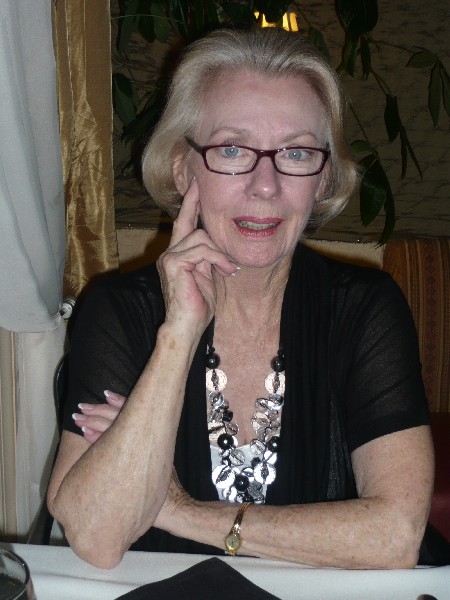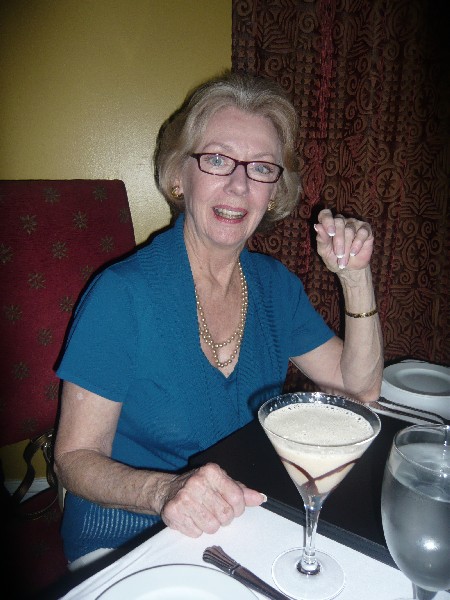The Year Of Magical Thinking by Joan Didion
St. Augustine's A Classical Theatre
By: Edward Rubin - Nov 01, 2011
The Year of Magical Thinking
Performed by Anne Kraft
Directed by Christine Fogarty
A Classic Theatre Production
Gamache-Koger Theatre
Ringhaver Student Center / Flager College
50 Sevilla Street
St. Augustine, Florida
Friday, September 23, 30 @ 7:30 PM
Saturday, September 24, October 1, 24 @ 7:30 PM
Sundays, September 25, October 2 @ 2:00 PM
Reservations: aclassictheatre@hotmail.com
Tickets at box office
Tickets $20 Adults, $18 Senior, Students $10
When The Year of Magical Thinking, Joan Didion’s memoir on death, dying, and grief, hit the bookstores, preceded by a mile-high stack of canonizing reviews, over a million books flew off the shelf like bats leaving a cave. Obviously, the subject of the 2005 National Book Award winner, the sudden death of writer John Gregory Dunne, her husband of forty years, during the ultimately fatal illness of their only daughter, captured the attention of the aging baby boomer generation—all busily watching those around them dropping dead like flies.
Two years later The Year of Magical Thinking, adapted to the stage by Didion, directed by David Hare, and starring Vanessa Redgrave, opened on Broadway at the Booth Theatre to mixed reviews. The main complaint, which echoed mine, was that Redgrave never becomes the character, any character for that matter, but remained Redgrave delivering Didion’s words. Worse still, in going from page to stage, the book’s harrowing account of events – a heartbreaking confession of Didion’s deepest thoughts – now being addressed to an audience rather than being allowed to blossom in the mind of the reader, lost much of its intensity. What was a prayer on the page, to paraphrase one critic, was now a sermon on the stage.
This was not so with A Classic Theatre’s production of Magical Thinking. From the very opening of play when actress Anne Kraft, comes downstage, front and center, and anxiously tells the audience with great insistence that “This happened on December 30, 2003. You might think that's awhile ago, but you won't when it happens to you. And it will happen to you. That’s what I am here to tell you,” we just know that we are in for an emotional ride. Just how great of a ride we were to find out during the play’s 2 hours (one intermission) as we watched the actress’s body and soul, mind and heart, twist and turn, as she slowly morphs into Everywoman, if not Joan Didion herself.
The story unfolds with the couple’s only daughter having fallen into septic shock from a runaway pneumonia infection. Both husband and wife have just returned home from visiting their daughter at New York's Beth Israel North hospital where she lay in an induced coma. While talking over dinner plans from kitchen to living room, Dunne, enjoying his second whisky, quietly slumps over in his chair. Though later declared dead from a massive heart attack, for a moment Didion mistook this event for a failed joke. “Stop kidding,” she says. It is here that Kraft, speaking with ironic accuracy, and more than a dollop of skepticism – familiar Didion touches – introduces the audience to ‘magical thinking,’ the kind of thinking that will make Didion unable to throw out her husband’s shoes because he will need them when he returns.
Though the play, if one can call it that, is not exactly great drama – it is not Long Day’s Journey into Night or Death of a Salesman – it does make for a deeply moving and beautifully written monologue, a highly literate one at that, of one woman’s journey, from the denial to the eventual acceptance of her husband’s and daughter’s death. It is also a tour de force that allows Kraft, a master at turning words into fully blown feelings and emotions, to show her acting chops. Channeling Didion’s panoply of continually changing faces, Kraft plays all the various chords of the playwright’s persona with great delicacy. We get the wise, bewildered, pained, compassionate, slightly hysterical, numb, all knowing, detached, loving, as well as the “cool, calm, and collected” Didion, as one ambulance attendant tells a concerned hospital doctor.
Step by small step, detail by detail, the play builds and a picture forms as Kraft feeds the audience a massive amount of information that Didion has obsessively kept track of. With great clarity she lists the physical circumstances surrounding her husband’s death, and her daughter’s illness. We hear about the syringes left by the paramedics who tried to revive him; the small spot of blood on the rug where presumably he hit his head at one point; the exact times that she called her doorman, dialed 911; the exact minute of the ambulance’s arrival and departure, as well as what every social worker and doctor at the hospital said. We also hear the names of all the medications and medical procedures that her husband and daughter received—the premise being that if Didion can learn enough and is vigilant enough she will find a way to bring back her husband and save her daughter.
The play on Broadway was all of ninety minutes with no intermission. It seems Redgrave, mostly sitting on a chair, gave a very fast reading. Kraft’s 2 hour, hauntingly honest performance, beautifully punctuated with self-reflecting, real-to-life pauses and a free range use of the stage, allowed for a more considered, in-depth approach. While the direction, in the main, was adequate, a few of Christine Fogarty’s choices appeared ill conceived. This includes the addition of distracting bits of music, as well as having the actress, while discussing a family outing, inelegantly, not once but twice, spread a table cloth onto the stage floor and plop down on it. Getting up was just as awkward. I say, ditch these needless accessories! Of course, this is a very small complaint given the devastating emotional power of both actress and play.





